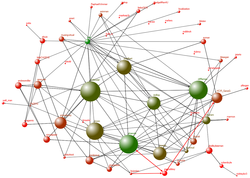Understanding and Responding to the Larger Societal Context
Leadership Dimension #7

Introduction:
The administrator understands the larger political, social, economic, legal and cultural contexts impacting the school and responds appropriately by giving consideration to the unique and diverse community characteristics and needs.
Administrator Descriptors:
- advocates for the interests of students
- scans the environment, identifies and communicates trends and issues to the school community and then responds appropriately
- demonstrates a knowledge of local, national, and global issues and trends related to education
- assesses and responds to diverse community needs in the context of the vision and mission of the community
- advocates or the community's support of the school and larger education system
- maintains positive public relations and communication practices to engage the broader community in support of the school
The administrator understands the larger political, social, economic, legal and cultural contexts impacting the school and responds appropriately by giving consideration to the unique and diverse community characteristics and needs.
Administrator Descriptors:
- advocates for the interests of students
- scans the environment, identifies and communicates trends and issues to the school community and then responds appropriately
- demonstrates a knowledge of local, national, and global issues and trends related to education
- assesses and responds to diverse community needs in the context of the vision and mission of the community
- advocates or the community's support of the school and larger education system
- maintains positive public relations and communication practices to engage the broader community in support of the school
List and Identify Evidence/Artifacts:

One of the things I do fairly well is to remain current with local, national and global trends in education. I very much enjoy engaging in attaining knowledge surrounding the societal contexts in which the transformation of education is taking place. One of the best ways I stay in touch is through my PLN on Twitter. There is always valuable information and ideas to ponder. I like to make sense of the world of education and at this point we are moving at such a pace that it is exciting and daunting all at the same time. My work on my dissertation surrounded the idea of social network theory. There is value in the strong and weak ties that people make. In the world we now live in, those ties are much more complex. We can and should be tied to individuals throughout the world. This exposure provides a broadening of perspectives that the world has never seen. But in the face of all these weak ties, we are sometimes losing our capacity to make strong ties. The idea of building social and human capital in a school, making use of and developing strong ties, is the net that can help a school move forward. It can also be the safety net for new and veteran teachers to take risks. As individuals we are only able to really maintain ties with no more than 150 people. But the capacity for a group of people, for example a school staff, to each develop ties with 150 people broadens the capacity for all. Much like I mentioned in the first leadership dimension, the relationships we establish, the ties that we create, can and do benefit the whole. The same idea works within the community. As the school staff make ties with parents and students living in the community, the ties grow between community members and strengthens the community as well. It is this 'social network' that offers the possibility of transformation in a much richer way. When I get a little more time, I would like to explore this idea further.
Another way I engage in making meaning of the larger societal context is to travel to each of our feeder schools. I have worked with each of the assistant principals and principals in various capacities throughout the year. I have a good understanding now where our kids come from and it allows me to understand the context in which they are experiencing SCHS. As well, through helping in the development of the School Education Plan, I have gained new insight into what some of the things we do well in the school and areas to improve. This is all done with grounding in data analysis through various measures like APORI and Tell Them From Me surveys, along with some of the locally developed measurements we use. This data gives us the local context in which we can make sound decisions that benefit the students in our community and school.
Another way I engage in making meaning of the larger societal context is to travel to each of our feeder schools. I have worked with each of the assistant principals and principals in various capacities throughout the year. I have a good understanding now where our kids come from and it allows me to understand the context in which they are experiencing SCHS. As well, through helping in the development of the School Education Plan, I have gained new insight into what some of the things we do well in the school and areas to improve. This is all done with grounding in data analysis through various measures like APORI and Tell Them From Me surveys, along with some of the locally developed measurements we use. This data gives us the local context in which we can make sound decisions that benefit the students in our community and school.
Reflection:

I have always had an interest in the larger social context in which schools sit. It is an area I have done a lot of work, thinking and writing about the social networks that people create. It proves advantageous to individuals and communities to understand their role in the network as a whole. Although much of my work is theoretical, the living proof is in the dynamic of a school or community. The relationships that are created as a result of the network allow a network to survive and thrive. If those ties are broken, either new ties must replace the old ones or the community will cease to exist. The use of data collection, analysis and reflection is something that administrators need to do. All of these measurements whether quantitative or qualitative tell the story of the community. In that telling, the vision and mission can be reinforced and transformation can and will occur. Ultimately, what everyone does, is about people. It's about the relationships we foster and grow.
Areas of Growth/Areas of Excellence

For me this is an area of strength. I will continue to pursue understanding social networks and the ties that bind us together and what that all means in the growth and transformation of schools into truly 21st century teaching and learning organizations.
